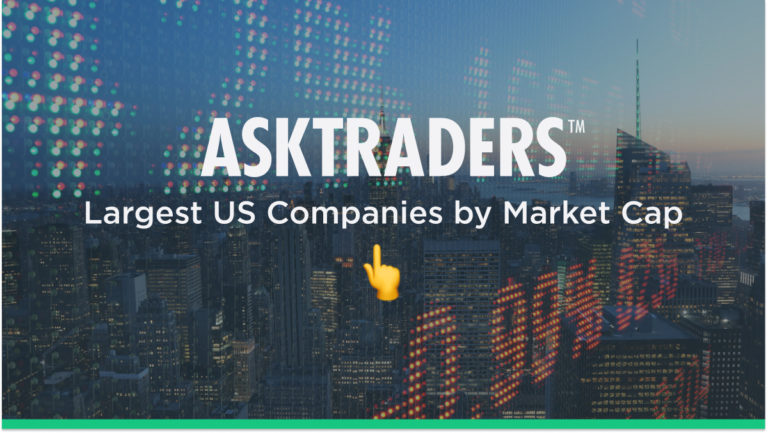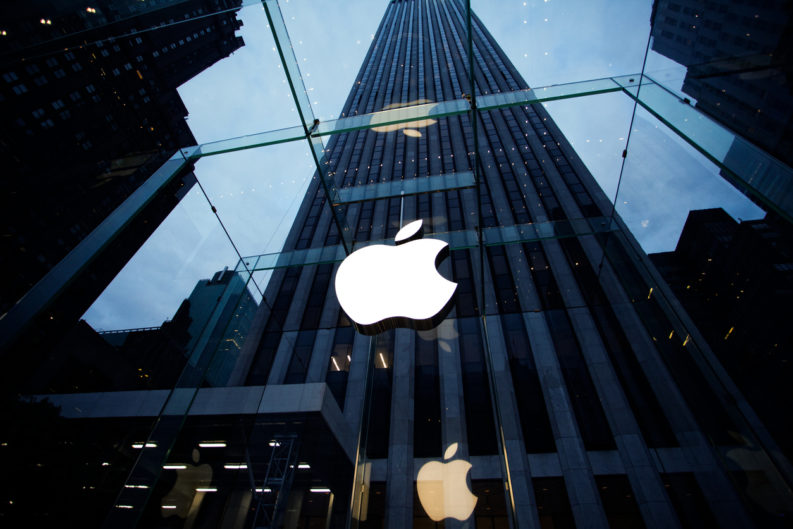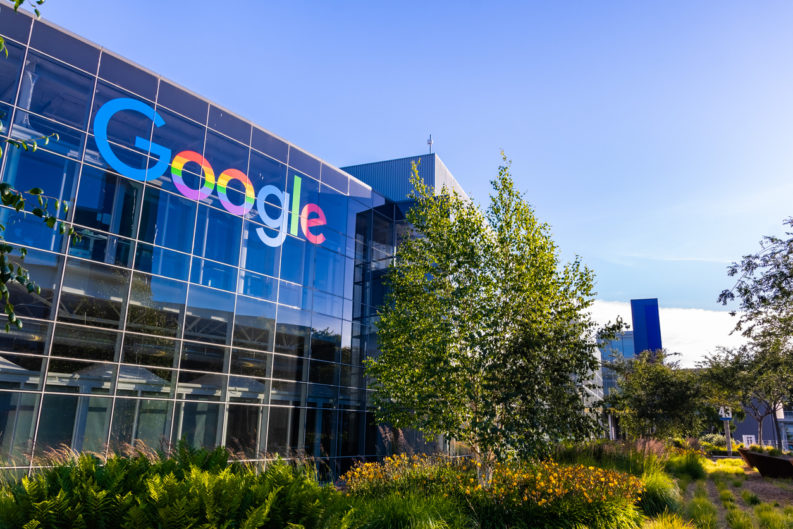
How do we define largest?
Before we begin ranking these companies, we first must decide what we mean by largest. This can be defined in multiple ways, from their market share to sales revenue or total profits, but for our list, we will rank by market capitalisation. This can be used to gauge public opinion on a company as it is the market value of a public traded company’s outstanding shares. This equity value is calculated simply by multiplying the share price by the number of outstanding shares.
10 Largest US Companies
| Rank | Company | Market Capitalisation ($bn) |
| 1 | Apple | 2430 |
| 2 | Microsoft | 1920 |
| 3 | Alphabet (Google) | 1480 |
| 4 | Amazon | 1155 |
| 5 | Tesla | 746 |
| 6 | Berkshire Hathaway | 614 |
| 7 | UnitedHealth | 497 |
| 8 | Johnson & Johnson | 469 |
| 9 | Meta Platforms (Facebook) | 445 |
| 10 | Visa | 444 |
Source: CompaniesMarketCap.com
1. Apple (AAPL)

Apple tops our list as not only the largest company in the US, but the world. Its market capitalisation is over $2tn US Dollars. Being a major hardware and software developer that innovates and produces all kinds of technology.
Its best-selling products are smartphones and computers, which it began producing in the early 2000s, leading to its market-leading iPhone, iPad, iPod, iMac, AirPods and various other designs. These products, combined with their own operating system, have allowed Apple to build a high level of brand loyalty through the ease, convenience, and advancements they provide. This has helped Apple become one of the most valuable and recognisable brands in the world.
Steve Jobs, Steve Wozniak and Ronald Wayne founded Apple in 1976 and took the company public four years later. In the coming two decades, Apple would see a rise and fall – owing to power struggles between executives and competitors. Examples include Microsoft, which has consistently shared a portion of Apple’s market share, a battle still going on to this day. Apple also faced competition from NeXT, which was founded by Jobs after leaving Apple in this period.
In 1997, Apple came close to bankruptcy and decided to acquire NeXT, bringing back Jobs as CEO and beginning the development of modern consumer technology with the above-mentioned iPhone, iPod and iMac produced in the following decades.
In the present day, Tim Cook is now CEO of Apple and has been since taking over from Jobs in 2011. More recent developments in Apple’s strategy is its purchase of smaller tech companies, such as Beats Electronics, AuthenTec, Dialog Semiconductor and Anobit Technologies. These acquisitions help Apple sustainably grow by branching into different products and incorporating these companies already developed technology into their own products, like AuthenTec’s fingerprint technology.
2. Microsoft (MSFT)
Second on our list is another of the Big Five American information technology companies in Microsoft. Much like Apple, Microsoft develops hardware and software, such as its consumer technology in the form of Xbox, for example. The company also leans towards technological service provisions. These include, but are not limited to, cloud solutions, operating systems, applications like Word and PowerPoint and the popular search engine Bing.
Bill Gates and Paul Allen founded Microsoft in 1975 and Gates ran the company as CEO until Steve Ballmer took over in 2000. Ballmer took the company in a slightly different direction, wanting to take a ‘devices and services’ strategy, leading to the acquisition of Nokia’s devices and services division. This led to the production of Microsoft’s first mobile phone. This strategy also led to Microsoft’s first personal computer being produced in 2012 – the Surface.
Microsoft also adopts a strategy of acquiring other companies, with these often being large companies in different markets that are already profitable. These include Activision Blizzard, LinkedIn, Nuance Communications and Skype Technologies.
In an effort to develop the future of technology, Microsoft has spent recent years attempting to invest and innovate in markets such as mixed reality, artificial intelligence and other related areas.
3. Alphabet (GOOG)

Previously Google LLC, the third place company on our list was restructured to Alphabet Inc in 2015, becoming a technology conglomerate. Alphabet acts as the parent company to Google and multiple former Google subsidiaries, allowing for a unification of the company’s ever-growing ventures and product lines.
CEO at the time and founder Larry Page said this would improve “transparency and oversight” (source: Investopedia) of the company’s actions and goals with the company stating it would also make the core Google business “cleaner and more accountable” (source: The Verge). In practice, it has not changed much of the company’s actions in the short term.
The main company, Google, manages its various digital platforms and services, with the largest, of course, being its search engine, even having a word in the dictionary based on using it. It also manages its video platform YouTube, its email service Gmail, its internet browser Chrome and even Android, directly competing with Apple.
The Other Bets division that helps make up Alphabet contains more earlier stage businesses, also in technological services.
Google was founded by Larry Page and Sergey Brin as simply a search engine back in 1998 and only went public in 2004. We know Google has expanded significantly since then, now having Sundar Pichai as CEO, and is now looking to invest and develop in up-and-coming industries such as Stadia cloud gaming systems and using Waymo in the self-driving vehicles market.
4. Amazon (AMZN)
Originally an online book retailer that ran out of a garage, Amazon takes the number four spot on the list. Since Jeff Bezos founded the company in 1994, as of 2021 it became the largest online retailor and marketplace in the world.
Amazon has expanded into all sorts of industries, so much so that it has gained a reputation as a disruptor of well-established industries via its mass-scale production and technological developments, often having other merchants provide on their marketplace.
The recent years have seen further change for Amazon, seeing Bezos stepping down as CEO in 2021 with Andy Jassy taking over the role. This comes at a time when Amazon looks to expand further into technological markets and cloud computing. It now provides multiple services, such as its subscription streaming and music services, along with attempting to expand towards artificial intelligence.
5. Tesla (TSLA)
In fifth place, we have Tesla, being the largest auto manufacture in the world by market capitalisation. Specifically, Tesla produces electronic vehicles, focussing on moving the world towards sustainable energy and transport.
It is the world’s largest seller of battery electric vehicles, having around 2.5% of the US market in 2022.
The vastly expanding company was named after famous physicist Nikola Tesla when Martin Eberhard and Mark Tarpenning founded it in 2003. In the next year, Elon Musk became the largest shareholder and preceded to take over as CEO in 2008, then taking Tesla public in 2010.
6. Berkshire Hathaway (BRK-B)
Number six on our list is the conglomerate holding company, Berkshire Hathaway. The main business of this company is to hold controlling stakes in other companies.
Berkshire Hathaway is by far the world’s largest conglomerate holding company, fully owning Duracell, GEICO, BNSF Railway Lubrizol, Dairy Queen and many other large companies. It furthers this by also having significant stakes in other large firms such as Kraft Heinz Company (26.7%), American Express (20%), Bank of America (11.9%), Coca-Cola Company (9.3%) and Apple (5%).
Berkshire Hathaway has been around for a great deal of time, being founded in 1839, having its main business in the cotton industry. This was until some 50 years ago when Warren Buffet acquired the struggling company and diverted its funds to buying and turning around other business.
To this day, Buffet still acts as CEO and chairman. Helping the company to invest wisely, he has guided the company to an average annual growth in book value of 19.0% to its shareholders since 1965, compared to 9.7% of the S&P 500 other the same time frame.
7. UnitedHealth (UNH)
Seventh on our list is healthcare and insurance company UnitedHealth Group, providing affordable and quality healthcare. It is a huge company, employing over 350,000 people who serve their 34 million worldwide customers, netting it the most revenue out of any healthcare company in the world. This revenue is produced by premiums it receives for its services along with the healthcare products it produces.
Based in Minnesota, UnitedHealth was founded by Richard Taylor Burke in 1974, originally naming the company Charter Med. Andrew Witty now sits as CEO, with Stephen Hemsley as Executive Chairman.
8. Johnson & Johnson (JNJ)

Next on the list is Johnson & Johnson. Founded in 1886, this company produces pharmaceuticals and medical equipment, which it sells worldwide.
In the last year, the company has started to restructure, announcing in November 2021 it would split into two companies with different focuses – one being medical technology and the other leaning more towards consumer health products.
Johnson & Johnson now has 250 subsidiary companies that it operates, providing many famous brands in the health industry. These range from Listerine to Band-Aid bandages, Tylenol medication, Johnson’s baby products and many more.
Johnson & Johnson was also one of the main vaccine providers in the US during the COVID-19 pandemic.
9. Meta Platforms (META)
Now known as Meta Platforms Inc and doing business as simply Meta, ninth place on our list has had multiple other names that have changed as the company has evolved.
Originally known as ‘The Facebook’ when it was founded in 2004 by Mark Zuckerberg and three other Harvard students, the social media company went on to simply become ‘Facebook’ before adopting its current name in 2021. According to the company, this name was changed to “signal its focus on the metaverse” (source: Reuters).
Facebook remains the largest social media network in the world and was founded as a way to communicate with family and friends online. The massive expansion in this market has meant Facebook is now also a powerful tool used by all sorts of business and organisations to influence a large audience easily and cheaply.
Most of Meta’s revenue is raised through advertising, with over 97.5% of its revenue from ads in 2021. Over the last few years, Meta has expanded its business and hold on the social networking market, acquiring or producing multiple other networking apps such as Instagram, WhatsApp and Messenger.
10. Visa (V)
Last on our list is Visa, which is a financial service corporation whose main business is providing funds to consumers electronically. It does this with its Visa credit, debit and prepaid cards that it provides to financial institutions who then issue their cards to customers, set rates, or extend credit.
Visa is no longer the largest payment organisation in the world after being overtaken by China UnionPay in 2015. Outside of China, however, Visa is still considered dominant, making claim to a 50% market share in the rest of the world for total card payments.
Visa has a massive infrastructure, mainly consisting of four secure data centres – two being located in the US, one in England and one in Singapore. These centres process almost all of the company’s worldwide transactions and have an expensive and complex security network.
Final thoughts
Having a good understanding of what you are investing in is a key aspect in any financial decision. We trust this introduction to the top 10 US corporates as measured by their market capitalisation will help you make more informed investing and trading choices. No matter your company of choice, review AskTraders’ list of trusted brokers to ensure a reliable and user-friendly trading experience.




